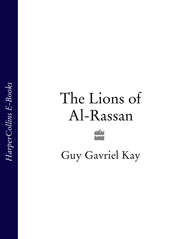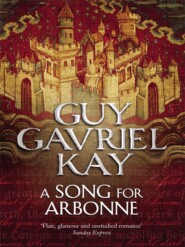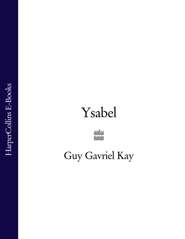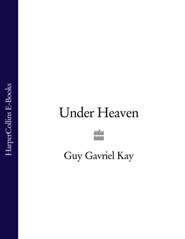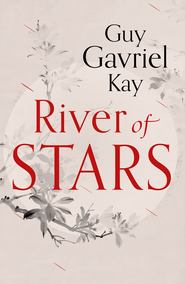По всем вопросам обращайтесь на: info@litportal.ru
(©) 2003-2025.
✖
The Last Light of the Sun
Автор
Год написания книги
2018
Настройки чтения
Размер шрифта
Высота строк
Поля
“No,” said Rhiannon. Her face was bone-white. She still hadn’t moved. “He’s yielded. Saved my life.”
“And what do you think he would have done if there’d been more of them here?” the man named Siawn asked harshly. “Or fewer of us in the house tonight, by Jad’s mercy? Do you think you’d still be clothed, and standing?” Alun had had the same thought.
They were speaking Cyngael. The Erling looked from one of them to the other, then he chuckled, and answered in their own language, heavily accented. He had been raiding here before; he’d said as much.
“She would have been claimed by Mikkel, who is the only reason we are so far from the ships. Or by his brother, which would have been worse. They’d have stripped her and taken her, in front of all of us, I imagine.” He looked at Alun. “Then they’d have found a bad way to kill her.”
“Why? Why that? She’s … just a woman.” Alun needed to leave, but also needed to understand. And another part of him was afraid to go. The world, his life, might change forever when he went outside. As long as he was here, in this room …
“This is the house of Brynn ap Hywll,” said the Erling. “Our guide told us that.”
“And so?” Alun asked. They’d had a guide. He registered that. Knew the Arberthi would, as well.
Rhiannon was breathing carefully, he saw. Not looking at anyone. Had never once screamed, he thought, only that one warning to him, when the horse smashed the window.
The Erling took off his iron helmet. His red hair was plastered to his skull, hung limply to his shoulders. He had a battered, broken-nosed face. “Mikkel Ragnarson leads this raid, with his brother. One purpose only, though I did try to change his mind for those of us who came for our own sakes, not his. He is the son of Ragnar Siggurson, and grandson of Siggur, the one we named the Volgan. This is vengeance.”
“Oh, Jad!” cried the man named Siawn. “Oh, Jad and all the Blessed Victims! Brynn was outside when they came! Let’s go!”
Alun had already picked up his sword, had turned, twisted through the others, was flying as fast as he could down the corridor for the double doors. Siawn’s desperate cry came from behind him.
Brynn ap Hywll hadn’t been the only one outside.
He hadn’t killed anyone yet, the thought came. A need was rising, with his terror.
TERROR WENT AWAY like smoke on a wind as soon as he was out through the doors and saw what there was to see. Its passing left behind a kind of hollowness: a space not yet filled by anything. He had been quite certain, in fact, from the moment he’d heard Dai’s first cry, but there was knowing, and knowing.
The attack was over. There hadn’t been enough of the Erlings to cope with Brynn’s warband here and their own Cadyri, even with the element of surprise. It was obviously to have been a raid on an isolated farmhouse—a large, specifically chosen farmhouse, but even so, this had been meant to kill Brynn ap Hywll, not meet his gathered force. Someone had erred, or had very bad luck. He’d said that himself, inside. Before he’d come running out into the yard to see the body lying here not far from the open doors. Not far at all.
He stopped running. Others were moving, all around him. They seemed oddly distant, vague, blurred somehow. He stood very still, and then, with an effort that took a great deal out of him, as though his body had become extremely heavy, Alun went forward again.
Dai hadn’t had anything but the knife in his belt when he’d gone out, but there was an Erling sword in his hand now. He was face down in the grass and mud, a dead raider beside him. Alun went over to that place, where he lay, and he knelt in the mud and put down his own blade, and took off his helmet and set it down, and then, after another moment, he turned his brother over and looked at him.
Not cheap, the selling of his life, the “Lament for Seisyth” went. The one the bards sang, at one point or another, in the halls of all three provinces during those winter nights when men longed for spring’s quickening and the blood and souls of the younger ones quickened at the thought of bright, known deeds.
The axe blow that killed Dai had fallen from behind and above, from horseback. Alun saw that by the light of the torches moving through the yard now. His blood and soul did not quicken. He held a maimed body, terribly loved. The soul was … elsewhere. He ought to pray now, Alun thought, offer the known, proper words. He couldn’t even remember them. He felt old, weighted by grief, the need to weep.
But not yet. It was not over yet. He heard shouting still. There was an armed Erling in the yard some distance away, his back to the door of one of the outbuildings, holding a sword to a nearly naked figure in a half-ring made by the Arberthi warband and Alun’s own companions.
Still on his knees, his brother’s head in his lap now, blood soaking into his leggings and tunic, Alun saw that the captive figure was Brynn ap Hywll, being held—in the most savage irony he could imagine—exactly as his daughter had been, moments before.
The clerics taught in chapel (and text, for those who could read) that Jad of the Sun did battle in the night under the world for his children, that he was not cruel or capricious as the gods of the pagans were, making sport of mortal men.
You would not have known it tonight.
Riderless horses moving in the yard among the dead; servants running after them, taking their reins. Wounded men crying. The flames seemed to have been put out except for one shed, burning down at the other end of the farmyard, nothing near it to be claimed by fire.
There had been more than fifty fighting men sleeping here tonight, with weapons and armour. The northmen could not have known or expected that, not in a farmhouse. Bad luck for them.
The Erlings had fled or were taken, or were dead. Except one of them held Brynn now, with nowhere to go. Alun wasn’t sure what he wanted to do, but he was about to do something.
You go. I don’t think I am equal to this. Not the voice, the brother, he’d known all his life. And for a very last word, a command, torn from him: Go!
Sending Alun away, at the end. And how could that be their last shared moment in the god’s world? In a life Alun had lived with his brother from the time he was born?
He set Dai’s head gently down and rose from the mud and started over towards that torchlit half-circle of men. Someone was speaking; he was too far away yet to hear. He saw that Siawn and Gryffeth and the others had come out now, the big, red-bearded Erling gripped between two of them. He looked over at his cousin, and then away: Gryffeth had seen him kneeling beside Dai, so he knew. He was using his sword for support, point down in the earth, looked as if he wanted to sink into the dark, trampled grass. They had grown up together, the three of them, from childhood. Not so long ago.
Rhiannon mer Brynn was in the yard as well now, beside her mother, who was standing straight as a Rhodian marble column, not far from the arc of men, gaz ing at her captive husband through the smoke and flames.
HE SAW OWYN’S YOUNGER SON—Owyn’s only son now, a sorrow under Jad—moving too quickly towards the other men, sword in hand, and he understood what was working in him. It could be like a poison, grief. Ceinion went forward swiftly, at an angle, to intercept him. A necessary life was still in the balance. It was too dark to read faces, but you could sometimes tell a man’s intention from the way he moved. There was death around them in the farmyard, and death in the way the young Cadyri prince was going forward.
Ceinion spoke, almost running, calling his name. Alun kept going. Ceinion had to catch him, lay a hand on the young man’s arm—and received a look that chilled him, for his pains.
“Remember who you are!” the cleric snapped, deliberately cold. “And what is happening here.”
“I know what happened here,” said the boy—he was still something of that, though his father’s heir as of tonight. And there were ripples that might flow from that, for all of them. Princes mattered, under Jad.
“It is still happening. Wait, and pray. That man with the sword is the Volgan’s grandson.”
“I thought as much,” said Alun ab Owyn, a bleakness in his voice that was a sorrow of its own to the cleric hearing it. “We learned he was leading them, inside.” He drew a breath. “I need to kill him, my lord.”
There were things you were supposed to say to that, in the teachings, and he knew what they were, he had even written some of them. What Ceinion of Llywerth, high cleric of the Cyngael, anchor and emblem of his people’s faith in Jad, murmured amid the orange flickering of torches and the black smoke was: “Not yet, my dear. You can’t kill him yet. Soon, I hope.”
Alun looked at him, and after a stiff moment nodded his head, once. They went forward together into that half-circle of men and were in time to see what happened there.
The taken-away sword had struck the tumbled raider first, but a second Erling’s axe from behind and above had killed the Cyngael sooner.
She crouches by the fence until those first two bodies are left alone again—the one who knelt beside one of them standing and walking away—and then, not allowing any time for fear to take hold of her, she goes straight in, at speed, and claims a soul for the queen.
A moonless night. Only on a moonless night.
Once it was otherwise and easier, but once, also, they were able to fly. She lays hands on the body, and speaks the words they are all taught, says them for the first time, and—yes, there!—she sees his soul rise from blood and earth to her summoning.
It hovers, turning, drifting, in a stray breath of wind. She exults fiercely, aroused, her hair changing colour, again and then again, body tingling with excitement, even amid the fear of shod hooves and the presence of iron, which is weakening and can kill her.
She watches the soul she’s claimed for the Ride float above the sprawled, slain mortal body and she sees it turn to go, uncertain, insubstantial, not entirely present yet in her world, though that will come, it will come. She didn’t expect to feel so much desire. This isn’t hers, though, this is for the queen.
He turns completely around in the air, moves upwards, then comes slowly back down, touches ground, already gathering form again. He looks towards her, sees, doesn’t see—not quite yet—and then to the south he turns and begins to go, pulled towards the wood … as if to a half-remembered home.
He will reach them in the forest soon, taking surer, stronger form as he goes, a shape in their world now, and the queen will see him when he arrives, and will love him, as a precious gift, shining by water and wood and in the mound. And she herself, when she rejoins the others, will be touched by the glory of doing this as silver moonlight touches and lights pools in the night.
No moons tonight. A gift she has been given, this mortal death in the dark, and so beautiful.
She looks around, sees no one near, goes out then from that farmyard, from iron and mortals, living and dead, springing over the fence, up the slope, stronger as she leaves blades and armour behind. She pauses at the crest of the ridge to look back down. She always looks when near to them. Drawn to this other, mortal half of the world. It happens among the Ride, she isn’t the only one. There are stories told.
The auras below are brighter than torches for her: anger, grief, fear. She finds all of these, takes them in, tries to distill them and comprehend. She looks down from the same beech tree as before, fingers upon it, as before. Two very big men in the midst of a ring; one holding iron to the other, who came bursting out of the small structure, roaring for a weapon. It frightened her, the red heat in that voice. But he was seen by the raider before his own men could reach him, and pinned by a sword to the wall. Not killed. She was not sure why, at first, but now she sees. Or thinks she does: other men arrive, freeze like carvings, then more come, gather, and are there now, like stone, torchlight around two men.
One of the two is afraid, but not the one she would have thought. She doesn’t understand mortals well at all. Another world, they live in.






